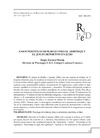Please use this identifier to cite or link to this item:
https://accedacris.ulpgc.es/jspui/handle/10553/7750
| Title: | Características deseables para el arbitraje y el juicio deportivo en judo | Authors: | Escorial Martín, Sergio | UNESCO Clasification: | 61 Psicología | Keywords: | Psicología del arbitraje Judo Características percibidas Árbitro |
Issue Date: | 2006 | Journal: | Revista Iberoamericana de Psicologia del Ejercicio y el Deporte | Abstract: | El trabajo de Guillén y Jiménez (2001) con una muestra de árbitros de 21 deportes diferentes puso de manifiesto la existencia de una serie de características necesarias para la correcta labor arbitral, según la propia opinión de los árbitros. Entre esos aspectos destacaron aspectos como «imparcialidad/justicia», «conocimiento del reglamento», «saber aplicar el reglamento», «igualdad en el trato a los deportistas» y «honradez». El objetivo del presente estudio es abordar esta misma cuestión con árbitros procedentes de un único deporte: el Judo. Para ello se empleó una adaptación del instrumento empleado por estos autores al Judo. El instrumento fue administrado a 73 árbitros de Judo de diferentes categorías, a una muestra de 68 judokas competidores y a 24 entrenadores de Judo. Los resultados muestran que existen varias diferencias entre la muestra de los árbitros de Judo y la muestra de árbitros de diversas disciplinas Guillén y Jiménez (2001). Además, pese a existir alguna coincidencia en la importancia concedida a algunas de las características, existen varias diferencias entre las personas pertenecientes a cada estamento deportivo, e incluso dentro del estamento arbitral en función de la categoría que se ocupe en el mismo. The study of Guillén & Jiménez (2001) with a sample of referees of 21 different sports showed the existence of a necessary characteristics for the correct referees work. Between those aspects they emphasized aspects like “impartiality / justice”, “knowledge of the regulation”, “knowledge to apply the regulation”, “equality in the treatment to the sportsmen” and “honesty”. The aim of this study is to analize this same question with referees coming from an only sport: the Judo. For it, an adaptation of the instrument used by these authors to the Judo was used. The instrument was administered to 73 referees of Judo (different categories), to 68 judokas and to 24 trainers. The results show that exist several differences between the sample of the referees of Judo and the sample of referees of diverse disciplines Guillén & Jiménez (2001). In addition, in spite of existing some coincidence in the importance granted to some characteristics, several differences exist between the people pertaining to each sport estate, and even within the referees group based on the category. |
URI: | https://accedacris.ulpgc.es/handle/10553/7750 | ISSN: | 1886-8576 | Source: | Revista Iberoamericana de Psicología del Ejercicio y el Deporte. Sevilla : Wanceulen, 2006- .-- ISSN 1886-8576. año 2006, vol.1, n. 1 |
| Appears in Collections: | Rev. Iberoam. psicol. ejerc. deporte. 2006. v.1, n.1 Artículos |
Page view(s)
114
checked on Jan 27, 2024
Download(s)
23
checked on Jan 27, 2024
Google ScholarTM
Check
Share
Export metadata
Items in accedaCRIS are protected by copyright, with all rights reserved, unless otherwise indicated.
